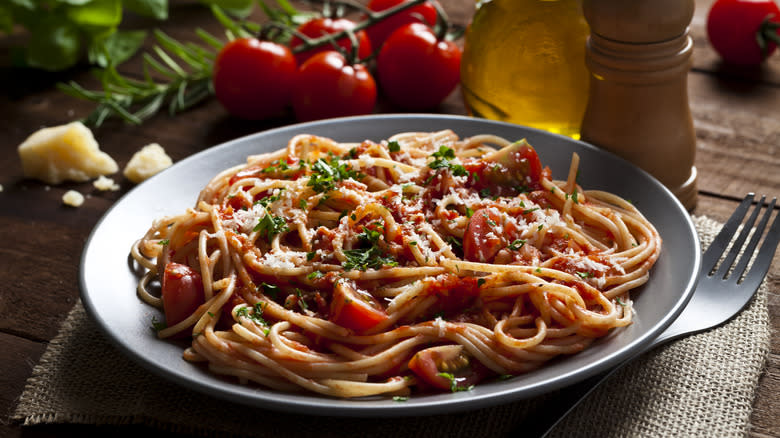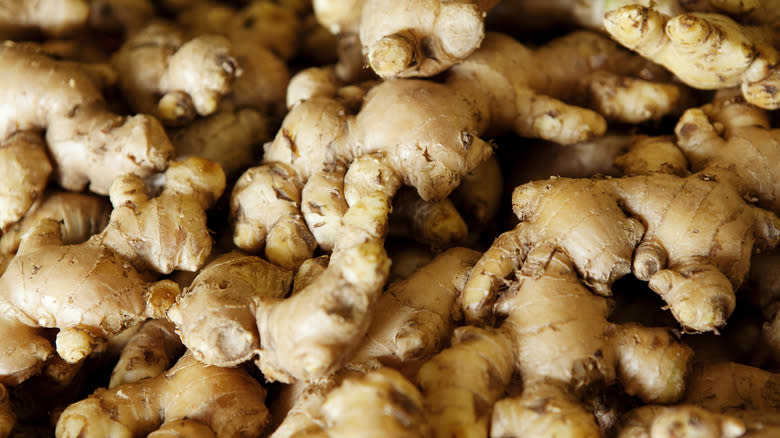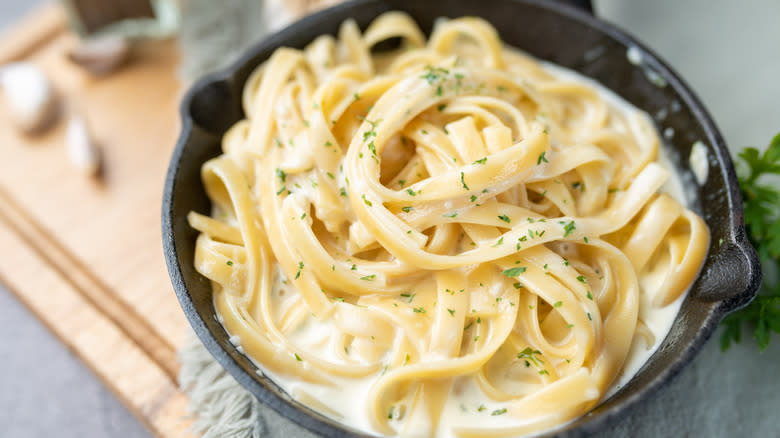The Unexpected Spice That'll Kick Pasta Sauce Up A Few Notches

If you love topping your pasta with tomato sauce, whether that's a simple marinara or a hearty ragu, there's one simple addition that can really add flavor and give it an extra punch — fresh ginger. If this sounds really novel to you, you've actually probably already had ginger in your pasta at some point. That's because many Asian noodle recipes, such as vegetable chow mein, call for ginger. The spice adds just a smidge of fire, giving that sensation of heat without going overboard and turning it into a sauce you'd call spicy.
The trick here is to use fresh ginger, as it has a more pungent and astringent flavor, although the ground version tends to be a bit more potent. You don't need much of the spice, either. Just a walnut-sized piece of peeled and chopped fresh ginger for every 7 ounces of canned tomatoes should give you the punch you're looking for without overpowering your sauce.
Read more: 7 Butter Brands You Should Buy, And 7 You Shouldn't
Why Ginger Works In Your Tomato Sauce

One of the reasons why ginger works well in tomato sauce is that it adds warmth. The slight heat of the spice perfectly complements the pasta topping, which is typically served warm, adding an element of coziness. Another reason that ginger can upgrade a basic tomato sauce is that it offsets the tomatoes themselves. Whereas tomatoes are acidic, ginger is alkaline, creating a balance of flavors and preventing your sauce from becoming either too bitter or too sour. At the same time, it has lemony notes to it, which can pair well with that acidity, all while maintaining balance.
Plus, it works well with some of the other ingredients in your sauce. The spiciness of the ginger can balance out the sweetness of any sugar you may have added to your recipe. You may also find that ginger has woody and earthy characteristics. Many pasta sauce recipes call for earthy spices such as oregano or even parsley. Since ginger shares these tasting notes, you can wind up enhancing those flavors even more. Also, its astringency can ramp up the pungent notes in a garlic-infused tomato sauce.
Don't Just Add Ginger To Tomato-Based Pasta Sauces

Tomato-based aren't the only pasta sauces that can get an upgrade from this ingredient. Another option is to add ginger to a simple lemon pasta recipe. Like tomatoes, lemons are acidic, and alkaline ginger can help to balance this flavor out and prevent your pasta from taking on a sour flavor.
Another option is to add ginger when making a quick pasta with garlic. The pungent notes of ginger play well with those same flavors in the garlic but add a bit more of a spicy kick than garlic alone. Just sauté both of these seasonings together in a bit of olive oil or butter until they're fragrant. You can even add a bit of ginger to a creamy Alfredo recipe. This can help to offset some of the richness of the sauce. Plus, the ginger works well with nutmeg, another warming spice that's sometimes added to Alfredo sauce.
Regardless of which pasta sauce you add it to, ginger has some great health benefits. It contains antioxidants, which can help limit free radicals in your body, and also has properties that aid in digestion. Next time you go to make pasta, try adding a bit of freshly grated ginger — regardless of what type of sauce you make — and get ready for an enhanced dish!
Read the original article on Daily Meal


